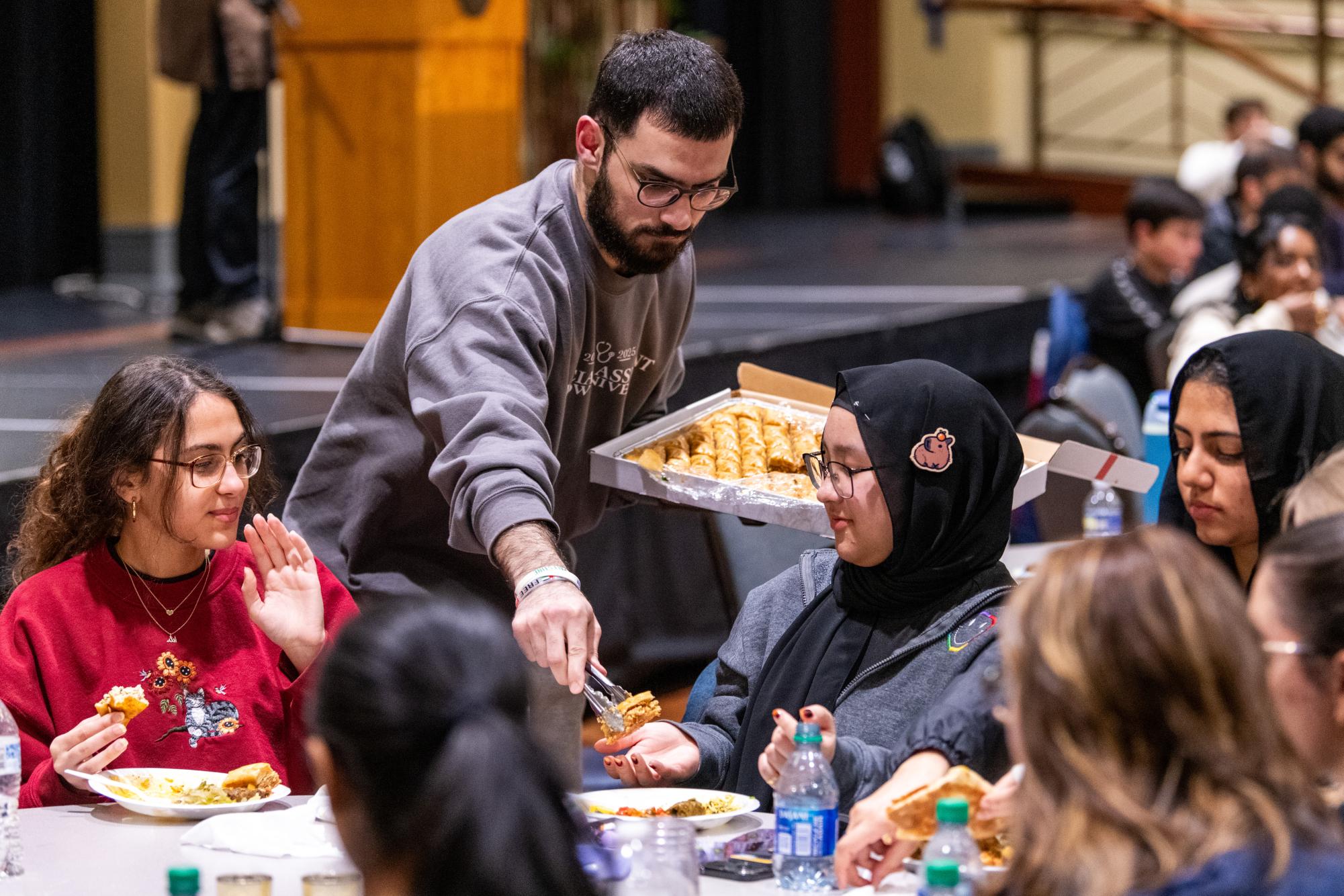According to Kenza Lahbabi, a Muslim and senior majoring in biology, the Muslim Student Association’s Fast-a-Thon is a great way to bridge the gap between Muslims and non-Muslims on campus.
“Sharing this with people like our friends and close ones that are not familiar with [Ramadan] can be really nice for us,” she said, “It’s nice to open up to something new and experience something outside of the norm.”
The Muslim Student Association hosted their annual Ramadan Fast-a-Thon in the William Pitt Union Assembly Room on Wednesday. The event featured prayers, a speech from guest speaker Iman Chris and a meal for attendees to break their fast, which is known as an Iftar.
Over 200 people came to the event, which was open to both Muslim and non-Muslim students, according to MSA Internal Vice President Raafay Khan-Afridi. Non-Muslim students were encouraged to fast for the day alongside their Muslim peers.
“I’m very grateful,” Khan-Afridi, a sophomore political science and economics major, said. “I think this event went very well. We actually had a lot more people end up walking in than we had signups. I think everybody ate and learned a little about Islam.”
Ramadan is the ninth and holiest month on the Islamic Lunar Calendar, during which believers fast from dawn until sundown in order to foster prayer, reflection, charity and community. Observing Ramadan is considered one of the Five Pillars of Islam.
“This month really holds down our purpose as Muslims and really brings us back to the root of who we are,” Lahbabi said. “It’s a great time to grow as a person.”
For Lahbabi, Ramadan is also a time to gain perspective.
“It’s very much family time and very much religious time,” she said. “I think it’s easy to get distracted [during] the rest of the year with everything going on in society.”
Mohammed Ali, a first-year undecided major, said Ramadan is a “reset button” for him.
“Whatever mistakes I have made or however I’ve been straying away from the religion, Ramadan is my time when I get closer to God through fasting and through making sure I don’t miss any prayers,” Ali said.
Ali also noted Ramadan’s emphasis on togetherness.
“It’s a time of community, because you’re not the only one doing this,” he said. “We all have a different relationship with God, but during Ramadan, everyone is fasting. You see it all around the world.”
The event began with a series of prayers. At sunset, which was around 7:40 p.m. on Wednesday, the attendees broke their fast by eating dates, a common Ramadan food. Participants then moved to the adjoining room to pray Maghrib, one of five daily prayer sessions practiced in Islam.
The worshippers rejoined the non-Muslim attendees in the Assembly Room for rice, chicken curry, beef kebabs, samosas and baklava.
The MSA opened the event to both Muslim and non-Muslim students, allowing both groups to sit and talk together at the tables.
Amelia McCauley, who is not Muslim, said she loves learning about different cultures and religions.
“I feel like there’s a lot of misconceptions out there about different religions and cultures, and I feel like the best way to close things up is to go to an event and talk to people,” McCauley, a senior communication sciences and disorders and Spanish double-major, said.
McCauley also noted how Ramadan opened her eyes to the Muslim values of empathy and charity.
“It gives you a lot of perspective on how other people are living around the world,” she said. “So many people are experiencing hunger in the world, and I feel like the best way to feel empathy for that is to experience it to some extent for yourself.”
Khan-Afridi emphasized the benefits of educating non-Muslims about Islam at Fast-a-Thon.
“It’s one thing to read about Islam through what we hear in the media, [which] especially nowadays is not [always] good,” he said. “To be able to invite people here that maybe don’t know a lot about Islam to meet Muslims and see Islam in practice … I think it creates a sense of community.”
Lahbabi said she agrees with this sentiment, applauding the way that the Fast-a-Thon encourages interfaith connections.
“I think that Islam in the media is not portrayed correctly most of the time,” she said. “So having events like this enables people to see what Islam is at its core, not through some media outlet, but through people who are living it.”
According to Khan-Afridi, Muslims have a religious duty to invite non-Muslims to learn more about the religion, a practice known as “Da’wah” in Islam.
“[Islam] is not an exclusive culture,” Ali said. “It’s a set of beliefs that anyone can find and follow.”

